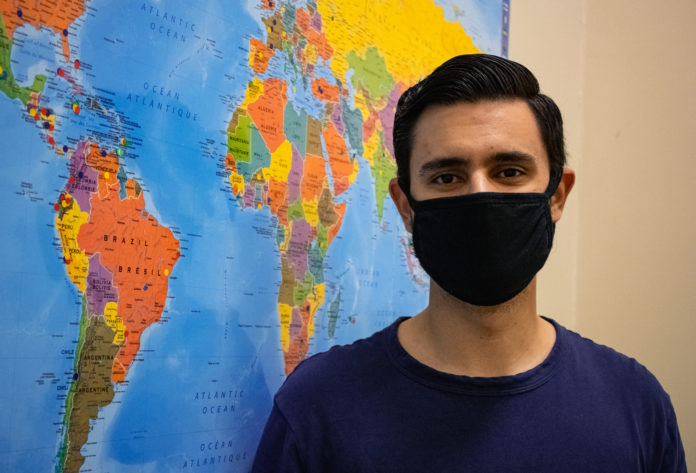
Juan Diego Rivas said he remembers landing in Fredericton from Ecuador for the first time three years ago. He was two weeks late, a chain of bureaucracy had delayed his arrival, he missed his welcome week and had to take the shuttle from the airport alone.
One week earlier, his father had been diagnosed with lymphatic cancer. The now fourth-year student wondered whether it was the right time to travel over 5,000 kilometres away for school.
“My father told me, ‘don’t worry about me. This is a sacrifice that we are making for your own good. This is your future for your career and you have to go through. You’re going to pull through and you’re gonna do it,'” he said.
Being a student is difficult for everyone, said Rivas, but international students must make sacrifices for their future and face unique challenges.
This year, he said his father’s cancer has returned and because of the COVID-19 pandemic, treatment is less accessible. His father lost his job and must isolate to avoid exposure of the virus.
Rivas said he is doing what he can to help from afar and has launched a GoFundMe campaign to help cover treatments. Going home is not an option for Rivas and doing so could put his father at risk of exposure.
Carrie Monteith-Levesque, international student advisor at STU, said most international students stayed in Fredericton for the school year and that few have gone home since the pandemic began.
Monteith-Levesque said one of the biggest struggles for international students is finances. For some students, the pandemic has added to these struggles.
“The pandemic has impacted people’s countries economically in so many ways. We’ve had family members who have been sick, we’ve had family members who have lost their businesses,” she said.
International tuition costs more than twice the price of Canadian tuition. International students also do not have access to as many scholarships as Canadian students, can only work 20 hours a week and do not have access to student loans.
Monteith-Levesque said she has been working hard to replicate some of the experiences these students would have had in a normal year.
“We’re still trying to give all students regardless of where they are opportunities to socialize, connect, build relationships, get to know the student community,” she said.
Kelly Humber Kelly, the mental health coordinator at STU, said even though she never experienced what these students are going through, she has been doing her best to help them in these uncertain times.
“I’m a white, middle class, cisgender person from Newfoundland who’s never had concerns in terms of health care or safety or any of those sorts of things. However, I can connect with these students and just provide a space to grieve or to deal with uncertainty, the anxiety that comes from uncertainty. The anxiety that comes from worrying about loved ones back home,” Humber Kelly said.
Rivas is not alone in missing out on crucial family moments. Late this summer, fourth-year Ecuadorian student Emilia Gutiérrez’s uncle was infected with the virus. For three weeks, she was in communication with her family, not knowing what she would see when she turned on her phone.
“I would be really scared to see my cousin’s voice messages because I wasn’t sure what was going on. To try to keep my mental health a little bit healthier than it was, I would try to wait to see how my family responded,” she said.
In mid-September, Gutiérrez got a phone call from her mother. Her uncle had passed away.
“It didn’t feel real,” she said.
There was no way she could go home for the funeral, she said. Instead, she had to watch it broadcasted over Zoom.
“It was weird to be at a funeral by myself crying on my computer. I’m really thankful we were able to have it. I think it managed to even give some closure,” she said.
